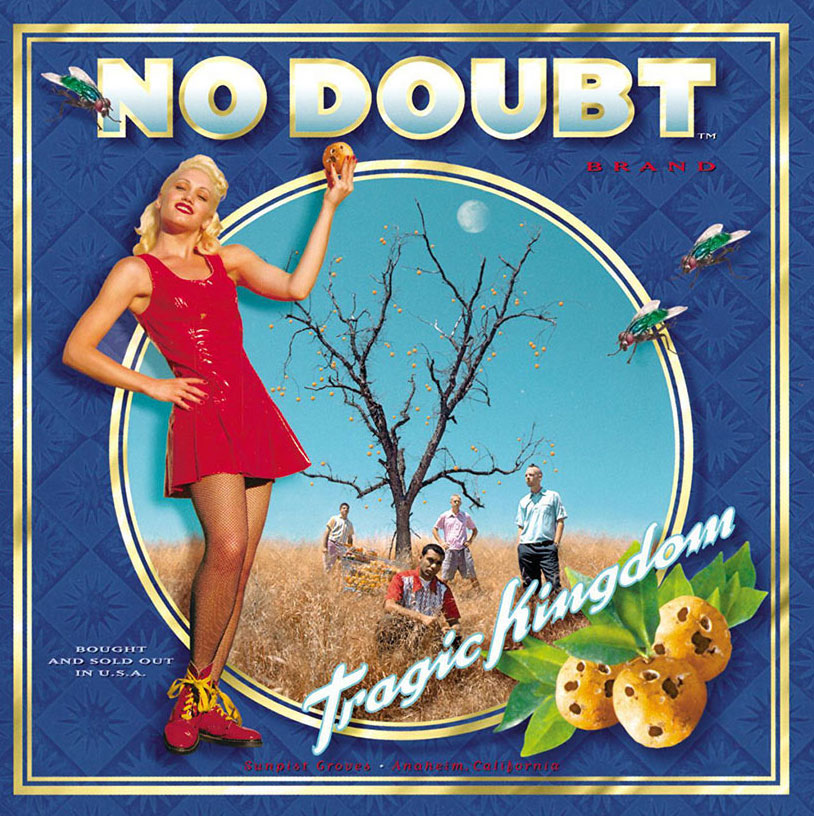News
‘Tragic Kingdom’: How No Doubt’s Heartbreak Seduced The Masses


No Doubt is the house that Tragic Kingdom built. Stacked with decade-defining hits – “Spiderwebs,” “Sunday Morning,” and, of course, the untouchable “Don’t Speak” – the album became a cultural phenomenon and sold more than 20 million copies worldwide; not bad for just a girl and her friends from Orange County.
Breezed in like Sunday morning
Like the theme park it alludes to, Tragic Kingdom is a pastiche of other worlds and cultures discovered through the import bin. These SoCal-dwelling Anglophiles helped put ska and dancehall back onto the radio in the U.S., while paying homage to the ska, 2Tone, and new wave acts they grew up on: Madness, The Specials, The (English) Beat, and The Selecter.
At a time when grunge was still considered music’s raison d’etre, No Doubt breezed in like Sunday morning with their pin-up punk aesthetics, bouncy ska, and quirky take on 80s pop. This was not the acoustic angst of the Lilith Fair festival, nor the raw rebellion of Hole’s Live Through This (one critic went so far to call Gwen Stefani the “anti-Courtney Love”), but hook-stacked, heartfelt and effervescent she-bop.
Their fair share of setbacks
Before Stefani’s platinum-lacquered locks and track pants were a permanent fixture on MTV in 1995, No Doubt had experienced more than their fair share of setbacks. In 1987 they lost a friend and former bandmate, John Spence; personal breakups and disillusioned band members were taking their toll on the band; and radio wouldn’t touch them.
Their self-titled debut album was a victim of poor timing. Released just as the Pacific Northwest was blowing up, no one wanted to pogo along to ska in 1992. Tout plans were scrapped, and it wasn’t until 1994 that the band got back into the studio for a proper follow-up album (their self-released The Beacon Street Collection notwithstanding).
Stood out from the pack
Despite its sunny veneer, Tragic Kingdom is widely acknowledged as a breakup album – not just of romantic relationships. During the making of Tragic Kingdom, Gwen’s brother and bandmate Eric Stefani left the group to become an animator on The Simpsons, while her boyfriend and bandmate Tony Kanal also ended their eight-year relationship, leading to the jilted-lover’s pop anthem, “Don’t Speak.” On a scale of One to Fleetwood Mac, the band’s internal dynamics lay somewhere in the middle, but heartbreak is a powerful motivator, and is responsible for the most affecting tracks on the album, from “Happy Now” to “Sunday Morning” and “End It On This.”
Even during the time when every Tom, Dick, and Charlie was sporting a pork-pie hat and checkered Vans, No Doubt stood out from the pack, powered by the megawatt star presence of their lead singer. Stefani’s vocal stylings easily adapted to the disparate musical styles that appear on Tragic Kingdom and lend themselves to the theatrical characters she often portrays.
More than the sum of its singles
So much of the tone of Tragic Kingdom is set by the first four tracks on the album; from Adrian Young’s opening reggae drumline on “Spiderwebs” to the instantly-recognizable riff on “Just A Girl,” it proved that, even with a hodgepodge of styles – when calibrated correctly – the album could hit that pop sweet spot.
Tragic Kingdom is not merely just the sum of a few singles, it also contains some unexpected surprises. While everyone with a pulse knows “Don’t Speak,” not everyone remembers the underrated ballad “The Climb.” With its bluesy opening and theme of self-reliance, it’s one of Eric Stefani’s lasting contributions to the album. There’s even some disco-funk courtesy of the slapping bassline of “You Can Do It.” Another surprising sonic moment comes at the end, the title track being an operatic ska song with more drama than an 80s musical soundtrack and an unexpected shredding guitar solo courtesy of former heavy metal guitarist Tom Dumont. Even as Tragic Kingdom progresses, No Doubt never lose their pep, finding a wonderful crescendo on the foot-stomping “Sunday Morning,” complete with Motown-esque “whoa whoas.”
If the album’s cover was any indicator, No Doubt was fated to navigate the tricky situation of being eclipsed by their frontwoman. Even as riot grrrl was still operating underground, Gwen Stefani became one of the most recognizable female rock stars in the world. Instead of ignoring the obvious, the band faced it head on, putting out a video for “Don’t Speak” that depicted this exact predicament.
Just two months after its release, on October 10, 1995, it shot to No. 1 on Billboard. The band’s confessional pop rang true to the adolescent masses around the world and, soon enough, their musical and style influence was taking root. In their effort to be everything to everybody, No Doubt became something for everybody.

-
Paul McCartney And Wings To Release Historic Live Album ‘One Hand Clapping’
-
Elton John Earns Multi-Platinum Plaque For ‘Diamonds,’ Shares ‘Step Into Christmas’ EP
-
Jon Batiste Announces ‘Uneasy Tour: Purifying The Airwaves For The People’
-
Best Political Punk Songs: 20 Essential Anti-Establishment Tirades





